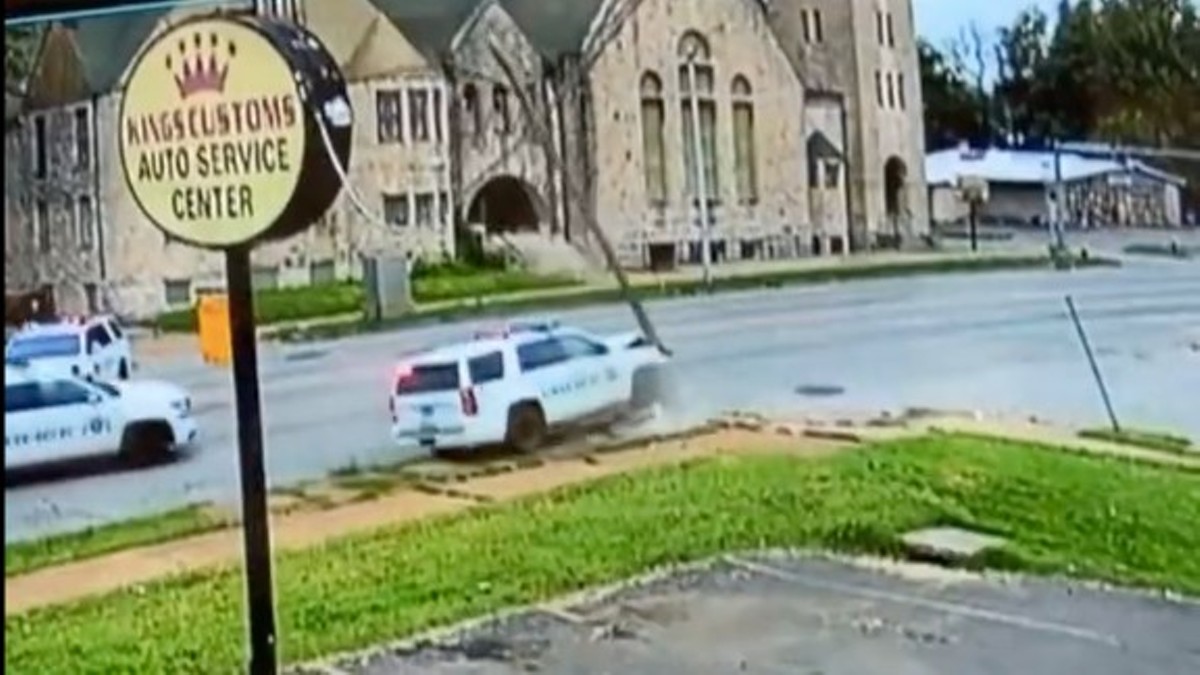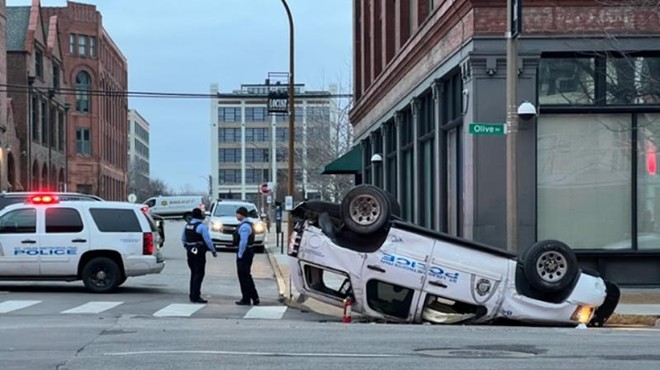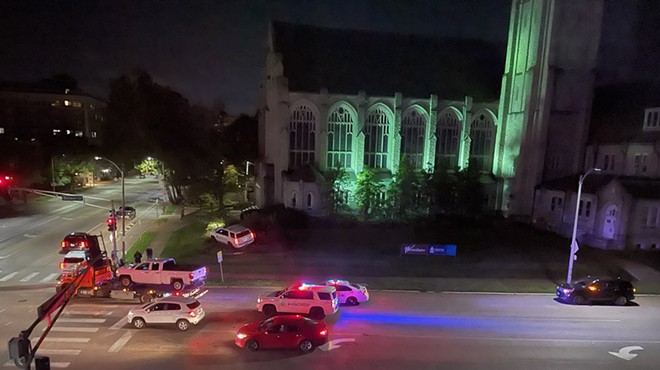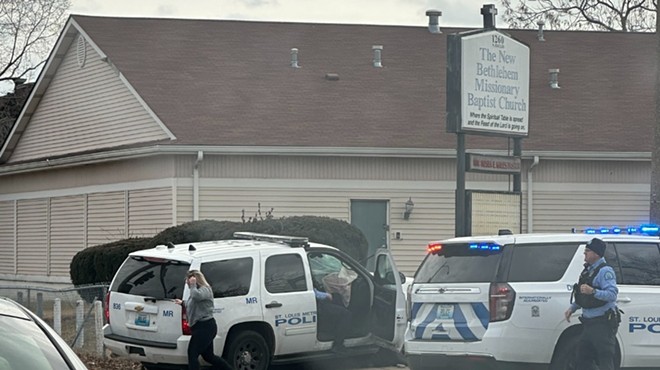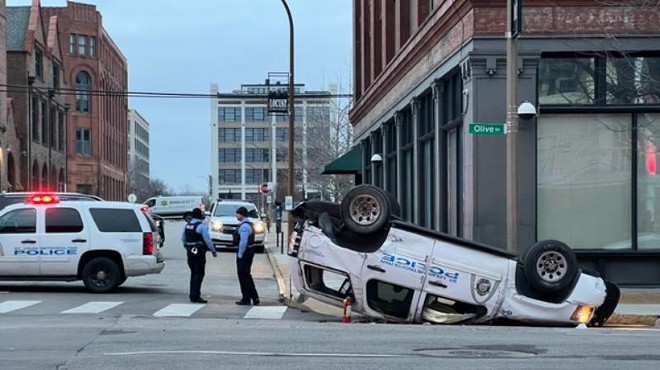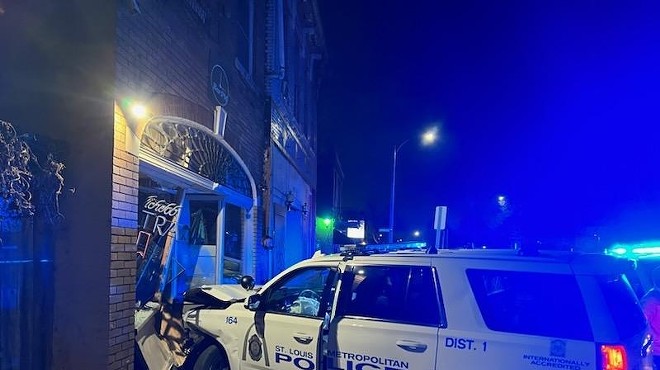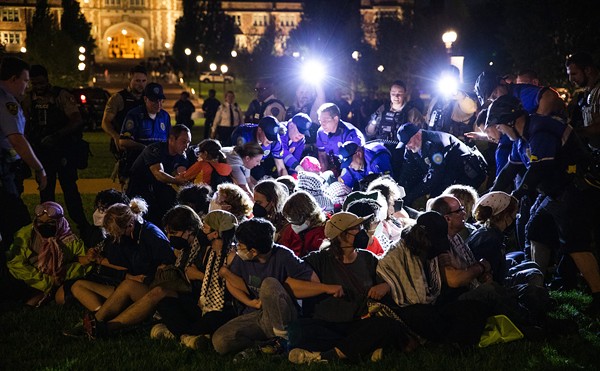There hasn’t been a large increase in accidents involving St. Louis police — or at least that’s what police told the Board of Aldermen yesterday. The police department always averages 100 to 150 crashes a year, there’s just more photos of them now.
The St. Louis Metropolitan Police Department has earned derision for a series of one-car crashes in recent months, including most prominently one where a police SUV plowed into a gay bar (and then arrested the bar’s owner), but also other accidents where police failed to acknowledge their actions or crashed in seemingly spectacular ways. Major Janice Bockstruck, commander of the Bureau of Specialized Enforcement for SLMPD, spoke about the incidents before the aldermen at their Public Safety Committee meeting on Thursday.
The 100 to 150 number Bockstruck gave the board adds up to close to one accident every three days. Of course, the timing of these accidents can vary year by year, but the estimate alone should be cause for concern. Shouldn’t it?
Bockstruck didn’t seem to think so.
The committee’s chair, Ward 4 Alderman Bret Narayan, asked Bockstruck if the department had seen more wrecks since it switched from sedans to Tahoe SUVs. Mayor Tishaura Jones had suggested that might be a cause for recent high-profile wrecks, as the RFT previously reported.
“We have always ranged from 100 to 150 auto accidents a year, fluctuating up and down since 2016,” Bockstruck said.
Narayan asked if, “anecdotally speaking” there was a feeling in the department amongst officers that the SUVs are more difficult to drive.
“You have a computer, you have a radio, you don’t always know where you’re going, it’s not the typical grocery go-getting I do in my car,” Narayan said.
Bockstruck responded by explaining that SUVs are considered optimal and are standard for policing nationwide. She said she doesn’t see an increase in the number of wrecks just because of the department’s transition to SUVs. Instead, she said, police have to multitask when driving.
“Policemen are responsible for a lot, and it’s a very different type of driving than the average citizen. A citizen knows, ‘I’m going from A to B’ and are concentrating solely — or hopefully concentrating solely — on their driving,” she said. “Police officers are responsible for obtaining a lot of information, digesting that information and their environment, while they’re driving.”
This can include monitoring radio communications and figuring out how and where to respond while driving, Bockstruck said.
“It is a giant responsibility to digest all the information that’s coming at you, at the same time as your environment and your driving skills,” she said.
Ward 14 Alderman Rasheen Aldridge brought up the recent series of crashes in the news and asked Bockstruck how long the department has been utilizing SUVs. She said they've been driving them for 10 or more years.
Aldermanic President Megan Green said the city has had the Tahoes since 2008.
“We’ve had them for a while so I would hope that we would have figured out in 15 years how to operate them safely,” Green said.
Aldridge asked if the current force had less experience driving this type of vehicle and if that is perhaps why these crashes have occurred.
“Our auto accident numbers are the same as they have historically been since 2016,” Bockstruck said. “I don’t see it being more, I just think more technology has brought forth more pictures of auto accidents.”
“A little bit more oversight there potentially,” Aldridge said.
“However you want to phrase that,” Bockstruck said.
Aldridge asked what steps the department was taking to ensure officers don’t keep crashing.
“Like I said, I think we take the proactive steps already,” Bockstruck said.
If an officer is involved in an “at fault” auto accident, they may receive disciplinary measures ranging from a written reprimand to suspension and loss of wages. Additionally for each at-fault accident the driver is sent to training, Bockstruck said.
“It’s more than most agencies do and we take that very seriously,” she said.
Narayan asked what happens if drivers are repeatedly found to have caused at fault accidents in the course of their career.
Bockstruck said it only counts as a repeated accident (for disciplinary purposes) if it occurred within three years of the previous crash. She said the department doesn’t “hold it against them for eternity.”
“Very seldom is it repeat offenders,” she said.
Ward 7 Alderwoman Alisha Sonnier asked Bockstruck if a policy was in place regarding toxicology tests for officers who crash their cars.
Bockstruck said the department adheres to the city admin regulation for all employees — which is to say cops are not always, or even most of the time, tested for drugs and alcohol after a crash.
Narayan chimed in to say that this issue was part of ongoing labor negotiations.
Subscribe to Riverfront Times newsletters.
Follow us: Apple News | Google News | NewsBreak | Reddit | Instagram | Facebook | Twitter | Or sign up for our RSS Feed

